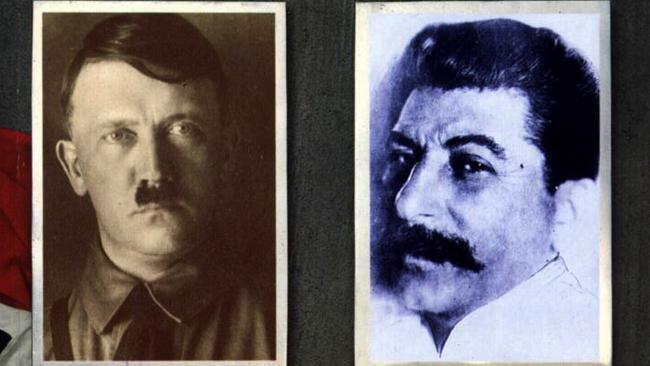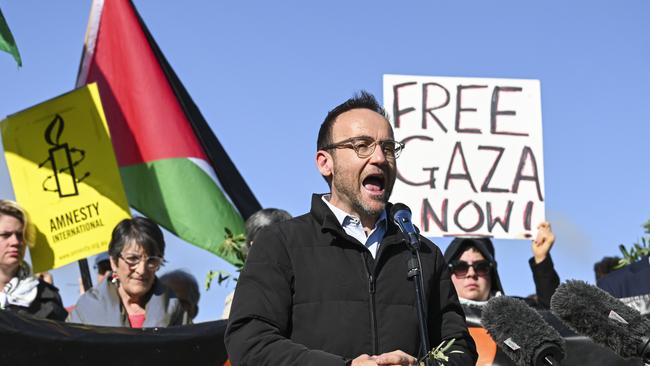Alliance against Israel, held together by loathing not love, is doomed to collapse

The pact, named after Soviet Foreign Minister Vyacheslav Molotov and his German counterpart Joachim von Ribbentrop, was a stunning example of how bitter enemies could find common cause when driven by mutual interests.
For years the Nazis had publicly denounced communism as a mortal enemy of their Aryan ideology, and the Soviets had responded in kind, casting fascism as the greatest threat to proletarian revolution.
Yet, in a move that bewildered and enraged the world, these two totalitarian regimes set aside their ideological differences to carve up eastern Europe, each securing their own sphere of influence.
This unlikely alliance between Adolf Hitler and Joseph Stalin, forged out of convenience rather than conviction, was a clear demonstration of the adage that “the enemy of my enemy is my friend”.
Both regimes recognised that their immediate goals – to expand their respective empires and to subjugate Poland – could be better achieved by working together rather than against each other.
The Molotov-Ribbentrop Pact was a cynical exercise in realpolitik, a temporary truce between two powers that understood that their ultimate clash was inevitable but could be postponed in the pursuit of short-term gains.

It was also a stark reminder of how alliances based on convenience, rather than shared values, are often fragile and ultimately doomed to collapse.
In today’s world, we see echoes of this historical alliance in the unlikely coalitions that have formed against Israel.
Just as Nazis and Soviets once joined forces against a common foe, so too have groups as diverse as the Greens political party, far-left academics, Trotskyites and Islamists found themselves aligned in their opposition to Israel. Despite their differing ideologies and goals, these groups have united in a shared disdain for the Jewish state, finding in each other a temporary ally in the struggle against a common enemy.
Genesis of the alliance
At first glance, the coming together of these groups seems improbable. The Australian Greens, a political party that once focused purely on environmental issues, now aligns with far-left academics who dominate the intellectual landscape of our universities. These academics, steeped in Marxist theory, find common ground with Trotskyites who advocate for permanent revolution, and with Islamists whose vision for the world is rooted in religious law and the establishment of a global caliphate. What binds them together is not shared values but a shared enemy – Israel.
To understand how these strange bedfellows have united, one must look beyond their surface-level differences and explore the deeper currents of ideology and emotion that drive them.
The Greens have long abandoned their single-issue focus on the environment, instead embracing a broader social justice agenda that includes fervent opposition to Israel.
Their rhetoric, once centred on climate change and conservation, now includes sharp criticism of Israel’s policies towards the Palestinians, framing the Jewish state as a colonial oppressor.
Far-left academics, for their part, have embraced a view that sees the world through the lens of oppressor and oppressed. In their narrative, Israel represents the last vestige of Western imperialism, a state that was born of colonialism and continues to perpetuate injustice against the Palestinian people.

These academics have indoctrinated generations of students with this perspective, creating a climate on university campuses where any defence of Israel is met with hostility and attacks on Jews, as supporters of Israel, are acceptable.
Trotskyites, whose revolutionary zeal has survived the collapse of the Soviet Union, see Israel as a symbol of capitalism and Western dominance. For them, the struggle against Israel is part of a broader struggle against the global capitalist system. They view the Palestinian cause as a rallying point for anti-imperialist movements worldwide and they are willing to align with any group that shares their goal of dismantling the current world order.
Islamists, meanwhile, have their own reasons for opposing Israel. Their opposition is rooted not in secular ideology but in religious conviction. They view the existence of a Jewish state in the heart of the Muslim world as a direct affront to their faith.
For Islamists, such as Hamas and its fellow travellers in the West, the destruction of Israel is a religious duty and they are willing to make common cause with secular leftists to achieve this goal.
Nature of the alliance
This alliance is not one of mutual respect or shared values; it is an alliance of convenience, forged in the fires of hatred towards a common enemy.
Like the Molotov-Ribbentrop Pact, it is a fragile and unstable coalition, held together not by love but by loathing. The various factions within this alliance are often at odds with each other on other issues, but when it comes to Israel they are united in their opposition.
What is striking about this coalition is how effectively it has managed to bring together groups that otherwise would be in direct conflict.
The Greens, who champion LGBTQ+ rights, have aligned themselves with Islamists who advocate for sharia law, under which homosexuality is punishable by death. Far-left academics, who preach the virtues of feminism and gender equality, have found common ground with Trotskyites who historically dismissed women’s issues as secondary to class struggle.
This alliance is held together by a shared narrative – one that casts Israel as the ultimate villain in a global drama.

In this narrative, Israel is not just a country with its own interests and security concerns; it is the embodiment of all that is wrong with the world. It is portrayed as a colonialist, apartheid state that oppresses the Palestinians with the full backing of Western powers.
This narrative is repeated endlessly in classrooms, media outlets and political discourse, reinforcing the belief that opposition to Israel is a moral imperative.
And this portrayal of Israel is increasingly tinged with disdain for Jewish people everywhere, so much so that historical anti-Semitic tropes are again rising to the surface of public discourse and violence against Jews, as in the 1940s, is justified.

The role of universities
The universities play a critical role in sustaining this alliance. It is on campus that young minds are shaped and indoctrinated with the idea that Israel is the villain in the story of global injustice.
Far-left academics, who dominate the humanities and social sciences, have used their positions of power to promote anti-Israel rhetoric and to marginalise pro-Israel voices. Students are taught to view the world through a binary lens of oppressor and oppressed, with Israel firmly placed in the role of the oppressor.
This narrative is reinforced by student organisations, many of which are influenced or controlled by Trotskyite groups. These groups organise protests, divestment campaigns and other actions aimed at delegitimising Israel. They create a climate on campus where any expression of support for Israel is met with social ostracism and even violence. It is now well known that Islamists also have been instrumental in organising and directing student protests.
The result is a generation of students who have been indoctrinated to view Israel as the enemy, not just of the Palestinians but of all oppressed people. This indoctrination extends beyond the classroom and into the broader culture, influencing the media, politics and public opinion.
Impact on discourse
The impact of this alliance on public discourse cannot be overstated. The narrative that Israel is a colonialist, apartheid state has become so pervasive that it is now accepted as fact by many in the media, academe and politics.
This narrative has led to a growing polarisation on the issue of Israel, with pro-Israel voices increasingly marginalised.
The alliance also has succeeded in framing the debate over Israel in moral terms, where opposition to Israel is seen as a moral duty. This has created a climate where any criticism of the alliance’s position is dismissed as immoral or even racist. The result is a chilling effect on free speech, where individuals who defend Israel are labelled as bigots or worse.
This stifling of dissent is reminiscent of the tactics used by totalitarian regimes, where dissenting voices are silenced and only the official narrative is allowed to be heard.
It is ironic that groups that claim to champion free speech and human rights are using these tactics to silence their opponents.
Future of the alliance
Like the Molotov-Ribbentrop Pact, the alliance against Israel is unlikely to last. It is an alliance built on hatred and convenience, not on shared values or genuine respect. As the interests of the various factions diverge, the alliance will likely fracture, just as the Nazi-Soviet alliance did when Hitler invaded the Soviet Union.
Already, there are signs of strain within the coalition. The Greens are finding it increasingly difficult to reconcile their social justice agenda with their environmental mission. Far-left academics are facing growing backlash from students and alumni who are tired of the one-sided narrative being pushed on campus. Trotskyites, whose revolutionary zeal has always been out of step with mainstream politics, are finding themselves increasingly isolated. And Islamists, who once found common cause with the left, are being challenged by reformist Muslims who reject their extremist views.
As these factions begin to turn on each other, the alliance will likely unravel. But the damage they have done to public discourse and to the perception of Israel will take much longer to repair. The narrative they have created – that Israel is the ultimate villain in a world of injustice – has taken root in the minds of many and it will take a concerted effort to challenge and dismantle it.
The story of the Molotov-Ribbentrop Pact serves as a cautionary tale for our times. It reminds us that alliances built on convenience and hatred are fragile and doomed to collapse. The coalition against Israel, like the Nazi-Soviet alliance, is an unnatural and unstable partnership, held together by little more than a shared enemy.
We who hold true to Western values of tolerance, freedom and prosperity must be vigilant in challenging the narrative that has been created. We must defend the right to free speech and the open exchange of ideas, even when those ideas challenge the prevailing orthodoxy. We must restore our ability to disagree well with each, and avoid absolutist dialogue and the cancelling of opposing views. And we must work to restore a balanced and fair discourse on Israel and the Jewish people.
Adam Slonim is director of the Middle East Policy Forum and a founder of Labor Friends of Israel. He is writing a book on the Gaza war, The Gaslighting of Israel.





In August 1939, two seemingly irreconcilable forces, Nazi Germany and the Soviet Union, shocked the world by signing the Molotov-Ribbentrop Pact, a non-aggression treaty that would pave the way for the partition of Poland and set the stage for World War II.